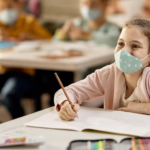Monkeypox is probably a term that you are already familiar with, if you’ve been tuning into the recent health updates in the news and media. It is rising to be a new public health concern as we learn to live amidst the COVID-19 pandemic. While there are many reasons why monkeypox isn’t likely to pose the same level of threat as COVID-19, there are a few reasons for concern as well.
In this article, we’ll take a look at everything the CDC has to say about the 2022 monkeypox outbreak to help you learn more about this disease and the risks that it presents.
Why is Everyone Talking About Monkeypox?
Monkeypox may have never received the attention that it’s getting now, but it isn’t a new pathogen. In fact, monkeypox was first discovered in 1958 in a colony of monkeys that were kept for research purposes, and the first case of monkeypox spreading to a human being was recorded in 1970.
So why are medical experts so concerned with this pathogen now after all these years? The cause for concern is the fact that monkeypox is now spreading from country to country in a way that it never has before. In the past, monkeypox cases were almost entirely limited to central and western African countries. All cases that occurred outside of Africa could be linked back to international travel to one of these countries or animals that were imported from them. Recently, though, we’ve begun to see monkeypox cases in countries that have never been impacted by the virus in the past. In May 2022, the first confirmed case of monkeypox in the United States was reported. As of July 27, 2022, there are now 20,638 confirmed cases of monkeypox, including 4,638 confirmed cases in the United States.
The fact that monkeypox is now spreading to countries that have not historically reported monkeypox is certainly cause for concern and has led many medical experts to fear that the virus has now mutated to become more transmissible.
What Are the Symptoms of Monkeypox?
According to the CDC, the signs and symptoms of monkeypox include:
- Fever
- Headache
- Muscle aches
- Respiratory symptoms
- A rash on the face or body that looks like blisters or pimples
- Chills
- Exhaustion
- Swollen lymph nodes
While monkeypox is a serious disease with symptoms that can last 2-4 weeks, it is rarely fatal; according to the World Health Organization, the case fatality ratio of this most recent outbreak of monkeypox is between 3-6%.
How Does Monkeypox Spread?
The CDC states that monkeypox is spread through close, personal contact, with skin-to-skin contact being the primary vehicle by which monkeypox is spread. Monkeypox is often transmitted by sexual activity but is not considered an STD since it can be spread by non-sexual contact as well.
While the idea that you could catch monkeypox from anyone that you make physical contact with is concerning, the method by which monkeypox spreads is actually a cause for optimism. Compared to diseases such as COVID-19 that can be spread through the air, diseases such as monkeypox that require physical contact to spread are much easier to control. The fact that monkeypox symptoms tend to be visibly obvious by the time a patient is contagious is another reason why experts are confident that monkeypox will never reach the same level of destruction as COVID-19.
Nevertheless, monkeypox still has the full attention of the CDC, WHO, and medical experts across the globe as they work to discover why the disease is now spreading to new countries and prevent another global pandemic.
How is Monkeypox Treated?
According to the CDC, a vaccine for monkeypox has yet to be developed. However, monkeypox and smallpox share a lot of genetic similarities. This means that vaccines and antiviral drugs designed to treat and prevent smallpox can potentially be used to treat and prevent monkeypox as well.
If you are experiencing any symptoms that might lead you to believe that you have contracted monkeypox, it is essential to visit a physician as soon as possible. Along with receiving treatment, reporting your case will also help physicians track and control the spread of monkeypox so that the outbreak can be contained.




